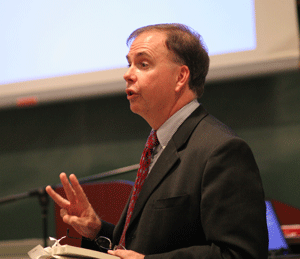As part of the Wabash College Experience Indiana Speakers and Artists Series, Historian David Bennett spoke Thursday on the life of Thomas Riley Marshall, Wabash Class of 1873. He shared stories of Marshall’s life from his new book "He Almost Changed the World: The Life and Times of Thomas Riley Marshall."
Bennett felt compelled to study and write about Marshall after reading many books about Woodrow Wilson with little mention of Marshall. "I have 23 books about Woodrow Wilson and only two of them even mention Marshall," he said.
Marshall has not been treated well by historians and Bennett became angered by the things he had read in history books about him. Since he could find no formal records of Marshall’s life, he set out to write a book to tell Marshall’s side of the story.
 Marshall was born in 1854. His family moved several times while he was young but finally settling in Pierceton, Indiana. He graduated from Fort Wayne High School and then enrolled at Wabash College. He went on to become a prominent lawyer and politician eventually becoming Vice President in the administration of President Woodrow Wilson.
Marshall was born in 1854. His family moved several times while he was young but finally settling in Pierceton, Indiana. He graduated from Fort Wayne High School and then enrolled at Wabash College. He went on to become a prominent lawyer and politician eventually becoming Vice President in the administration of President Woodrow Wilson.
Bennett spoke of Marshall’s life-long love of Wabash College. He eventually went on to become a Trustee of the College and mentioned his time at Wabash in many of his speeches. But his time at Wabash was clouded with controversy.
While Thomas Riley Marshall was on campus, he wrote a story for The Geyser, the school newspaper, of a woman who was a visiting lecturer on campus. She had been seen "playing footsy" with several boys at her boarding house.
After the story was printed, she sued Marshall for $20,000. Her attorney was Lew Wallace. The attorney Marshall hired from Indianapolis who went on to win the case in his favor was Benjamin Harrison, who later become President.
Bennett referred to Marshall as extremely bright and articulate however his fianc»e died the evening before they were to get married. He was deeply saddened and turned to alcohol before eventually remarrying. "His alcoholism consumed him for 15 years," Bennett said. "With the love and support of a caring wife, Lois, Marshall overcame his addiction and rebuilt his reputation, both in his community and throughout the state."
Marshall’s intelligence and ability to give a great speech led him to a career in politics. In a span of a few short years he was governor of Indiana and then Vice President.
When Woodrow Wilson suffered a debilitating stroke Marshall nearly assumed the presidency. "But no vice president had ever assumed power while the president was still alive," Bennett said. "At that time, there was no process in place for how that would happen." As it turned out, Marshall never did become President.
Bennett concluded his remarks by reading an excerpt from his book.
Born into relative privilege and called at a young age into public service, Thomas Riley Marshall stumbled through the early years of adulthood. Rescued from personal and professional oblivion by a devoted soul mate, well past the age of fifty he started a meteoric political ascent that took him the width of an artery away from the presidency. Through tragedy and disappointment he kept his faith in his God, his love for his wife and his devotion to his country. History will remember his as a man who put his belief in the system of American democracy above his own personal ambition, and until the day he died he remained a genuine Hoosier from rural Indiana.
For more information see:
He Almost Changed the World: The Life and Times of Thomas Riley Marshall